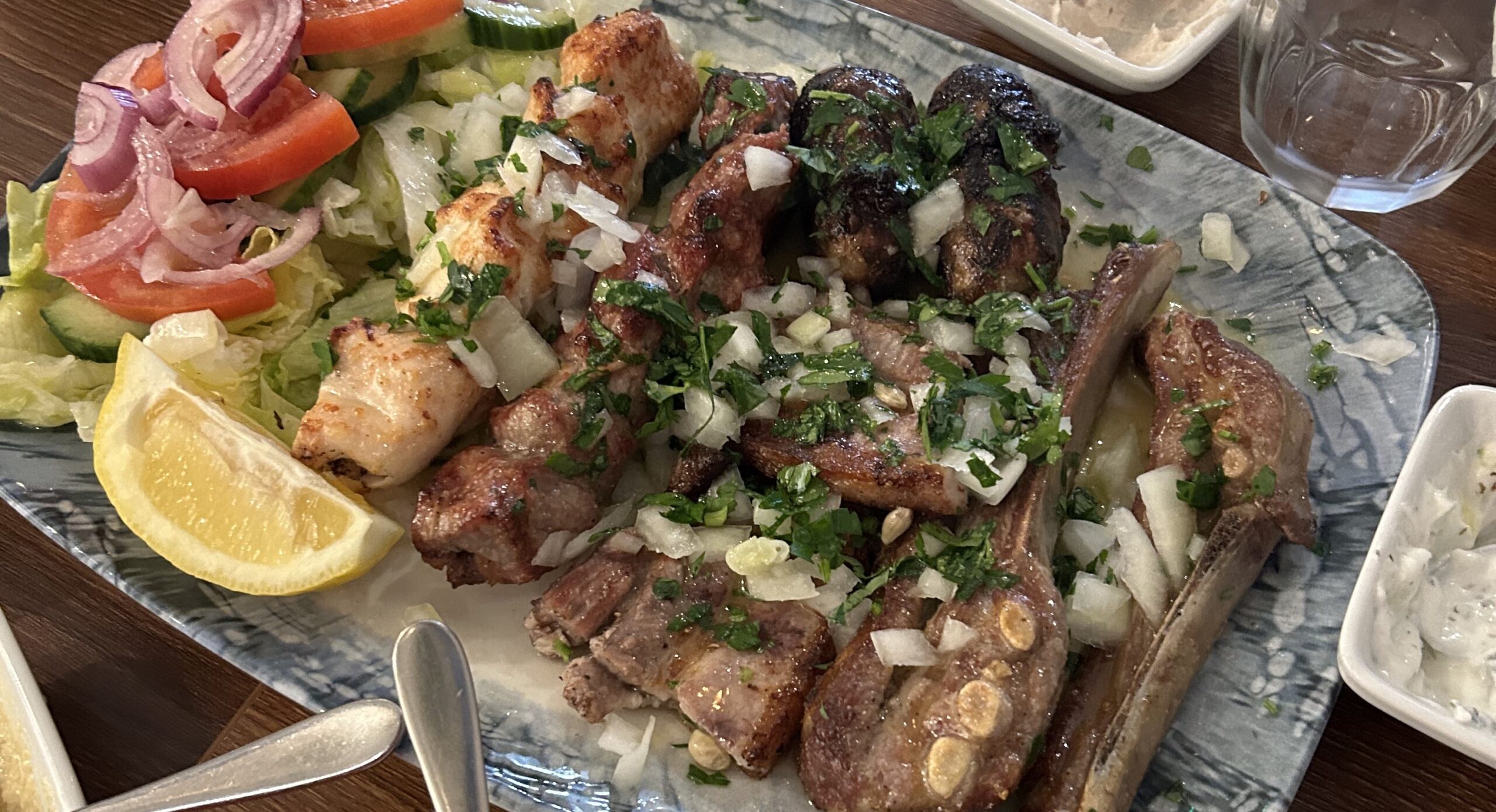After leaving Cyprus in 2020, Maria Papakleanthous found herself unsatisfied by the bland food she encountered in London. Her search led her to Uncle Tony’s Taverna, where the gemista transported her back to the familiar comforts of her grandad’s home.
Every 20th of July, my grandad Takis pays a visit to my family house in Cyprus, a five-minute drive from his home. He sits diagonally from me on the sofa and sips his sweet frappe that I make especially for him. Then, I wait with anticipation. The minute he feels ready, he starts narrating the same story I hear every year, on the same summer day.
On that day, in 1974, Turkey invaded the island. They claimed it was in response to a coup engineered by the Greek junta, the authoritarian regime in power in Greece at the time, as a means to assert its own divisive aims.
My grandad was called in as a soldier when the 1974 war began. He was fighting against the Turks when an anti-tank missile, shot by a non-recoil gun, exploded directly above him. He was thrown against the wall behind him, which caused his shoulder to bleed and his belly to feel like it would burst from the air pressure. He is still unsure how he survived it. “It’s a miracle,” he repeats annually.
This event was my grandad’s most traumatic life experience. So much so that he asked me to paint the scene. It now hangs from his kitchen wall to remind him of his courage. He was left a refugee when his hometown was seized by the Turks. The town, which he remembers as ‘Engomi’, is now known as ‘Tuzla’ under the control of the Republic of Northern Cyprus, a de facto state not recognised by the United Nations. He hasn’t been back home since 1974. Instead, he settled just 20 minutes away, on the opposite side of the green line dividing the country.

This war was one in Cyprus’ extensive history of battles and shifting political rule. Numerous conquerors have targeted the island since the late Middle Ages – Venetians, Ottomans, British. Today, their influence can still be seen, evident in the Cypriot dialect which, unlike Modern Greek, is infused with foreign words and phrases. This cultural distinction extends to culinary traditions like the rice-stuffed vine leaves, known as koupepia, the Cypriot variation of Greek dolmadakia. In Cyprus, we incorporate minced meat, akin to Middle Eastern cuisine, an addition which is absent in the Greek version. For such a small island, Cyprus has a vast and layered history.
The intense political tension amongst Greeks and Turks was already present in the the 60s and mid-70s, prior to the invasion. As a result, many Cypriots fled their mother nation and built new lives in what were then more developed countries like the UK, USA, and Australia. They brought with them the best way to understand and celebrate Cypriot culture – the food.
“Migrants wanted to cook the food that they would cook at home, to keep their identity.”
Jack Antoniou
Since moving to London in 2020, I go through periods of prolonged separation from the flavours of home and cravings for the food I left behind in Cyprus.
On one such occasion, longing for Cypriot food in London, I asked my French best friend to come with me to Uncle Tony’s Taverna in Finchley, north London. Finchley hosts a substantial population of Cypriot immigrants, alongside other areas like Palmers Green, Cockfosters, and Tottenham.
Barely through the door, the first thing that engulfs me is the sound of Soma Mou by the great Greek artist, Notis Sfakianakis. When I see the menu, I recognise every single dish. Unable to choose between anything, we order the meze, a selection of most menu items.
I speak to the waiter Jack (Iakovos) Antoniou, whose family migrated from Cyprus to the UK in the late 50s and has been employed in restaurants for decades.
In 1974, he explains that Cypriots either came to the UK, or paid £10 for a ship to take them to Australia. Once abroad, the migrants worked in the restaurant business; as they started gaining some money, they opened family restaurants. They started off with little takeaways and then expanded into successful businesses.
He says: “Migrants wanted to cook the food that they would cook at home, to keep their identity.” For them, migration represented a chance to forge a brighter future, an opportunity that was not as readily attainable in Cyprus, due to its political instability.
In his thick accent, a mixture of Cypriot dialect and English, he says: “They cooked kolokasi [taro root], mpamies [okra], makaronia tou fournou [baked pasta]. Before that you would never find such Cypriot dishes in restaurants. They did their home cooking and then they expanded it and made it well-known.”
He brings the starters: tahini, grilled halloumi, taramasalata, elies tsakistes [olives with coriander seeds] and more, all bursting with authentic and fresh flavours, a welcome change from the bland cuisine I’ve experienced in London. I’m dipping warm, sliced pitta bread in the smooth, garlicky tzatziki dip, when a man approaches our table and asks me in Cypriot dialect: “Which part of Cyprus are you from?” He could tell I was Cypriot because I ordered the meze, a quintessentially Cypriot choice in tavernas back home.

The man is the founder and head chef of Uncle Tony’s Taverna, Antony (Tony) Antoniou. He was born in the UK but his father migrated from Kato Paphos, Cyprus, in the 60s. Antoniou opened the restaurant in 2019 to spread his love for Cypriot food that was passed on by his family.
At this point, we are the only ones in the restaurant, along with one other table in the far right corner. True to Cypriot hospitality, Antoniou seizes the opportunity to engage us in conversation.
“We cook gemista [stuffed vegetables], afelia [pork marinated in red wine], and all these dishes that are all authentically Cypriot. By doing that, it helps me connect with Cyprus more. If I show you my spices, they are all from Cyprus – the cinnamon, the pepper, the bay leaves, everything,” he tells me, proceeding to go to the kitchen to bring his spices. At the mention of gemista, I start wondering if they taste similar to the ones my grandma Maro makes – probably not, no one does them like she does.
“Every three months I go to Cyprus and I bring all my herbs back with me”. Antoniou opens the box of oregano that he brought back from his latest trip to Cyprus. I close my eyes to take in the aroma.
Suddenly, I’m transported to the field behind my grandad’s house. I picture myself running around him in the burning sun, whilst he picks his herbs from the soil.
“I picked these up myself from the Lassa forest, it’s next to a river, close to where my grandad’s village was. I pick up a bunch, tie them together and hang them in the sun to dry,” says Antoniou, proudly holding up his fragrant oregano.
As I explain to my friend what each plate is and how we eat it in Cyprus, I’m filled with contentment. Despite being away from the island for a long time, with every bite of the succulent chicken souvlaki, my feelings of homesickness diminish. For Cypriot immigrants, food serves as a means of reconnecting with their homeland – a form of healing for the inability to return to the version of the home they left behind, a place that now largely exists only in memory.
